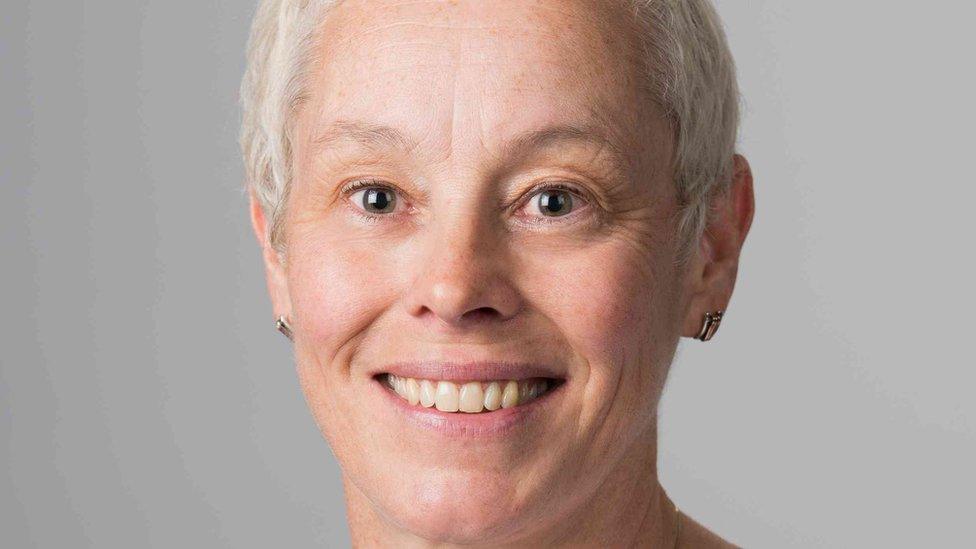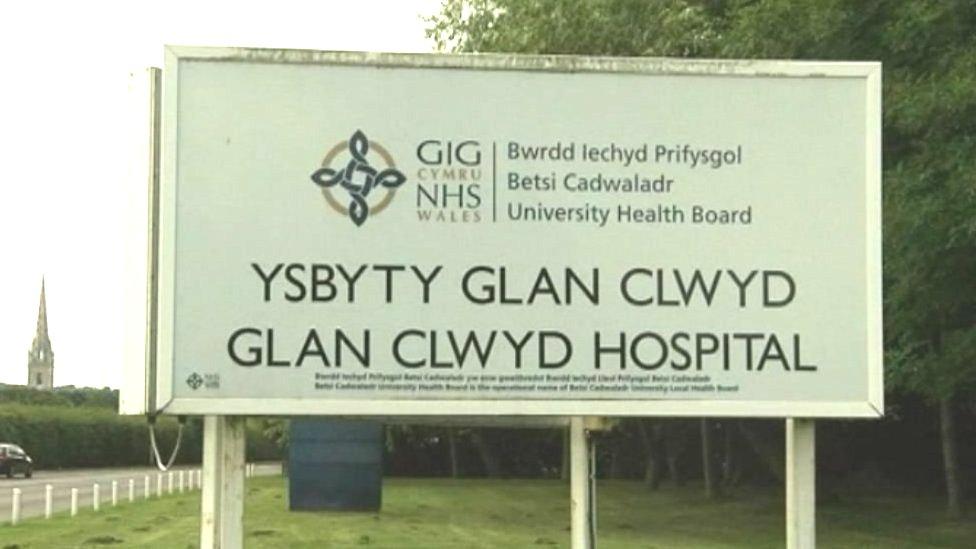Betsi Cadwaladr: Health board boss set to retire for personal reasons
- Published

Jo Whitehead said her decision to retire at this time was for personal reasons
The chief executive of an under fire health board has announced she is retiring from the NHS after less than two years in post.
Jo Whitehead will leave Betsi Cadwaladr, responsible for health care in north Wales, at the end of December.
In a statement, Ms Whitehead said she was bringing forward her retirement plans due to family circumstances.
The decision had been "extremely difficult", she added, and one she had "not taken lightly".
"The last few months have brought some serious health challenges for my father in law, with consequences for my husband who has had to bring forward his own retirement plans and go to Germany to be with his father," she said.
"This has caused us to consider how we want to spend our time and has led me to conclude that it is time for me to retire from my chief executive role."
Ms Whitehead was appointed chief executive of the health board in January 2021 and joined from Mackay Hospital and Health Service in Queensland, Australia. She was born and grew up in north Wales.
Betsi Cadwaladr health board was in special measures, under direct Welsh government control, from the summer of 2015 until November 2020.
'Revolving door'
Further failings have since been identified and it has narrowly avoided being put back into special measures since then.
Ms Whitehead said at the beginning of August that she was committed to working with the health board and put in place the required improvements.
The health board's hospitals include Glan Clwyd Hospital in Denbighshire, Wrexham Maelor Hospital and Ysbyty Gwynedd in Bangor.
In June, Health Minister Eluned Morgan announced Ysbyty Glan Clwyd, in particular its vascular services and emergency care, had been put into "targeted intervention".
This is the second highest level of oversight by the Welsh government.
The Welsh Conservatives' Darren Millar said the "revolving door" and "constant change at the top" were unhelpful and unhealthy.
"The NHS in north Wales desperately needs strong long-term leadership to overcome the ongoing challenges it faces and turn failing services around," he said.
"Betsi needs fixing and the next chief executive must have the ability to deliver change and make the tough decisions that are required without being hampered by political interference from ministers in Cardiff Bay," he added.
Llyr Gruffydd, of Plaid Cymru, said the health board was "struggling in terms of leadership and direction".
"Everyone in the north wants to see the health board succeed but we also know it's under huge strains due to a toxic combination of growing demand, staff shortages, overstretched workforce and senior management that has failed to deal with the challenges over the past decade," Mr Gruffydd said.
"The time has come for us to consider whether the current health board is too unwieldy to deal with those challenges and that wider change is needed to deliver the services patients in north Wales deserve," he added.

Betsi Cadwaladr's responsibilities include three general hospitals
A timeline of troubles
2013: The chairman and chief executive of the health board resign after health and audit watchdogs find a catalogue of management and financial problems
2015 and 2018: Two damning reports into the now-closed Tawel Fan geriatric mental health unit at Glan Clwyd, with management said to be "chaotic". One report detailed family claims of abuse, although these were dismissed by the follow-up review.
Betsi Cadwaladr was put into special measures in June 2015, reflecting "serious" concerns.
2016: Plans to centralise specialist vascular care at Glan Clwyd hospital were criticised, with claims lives would be put at risk especially in the Gwynedd area.
2017: Despite health bosses insisting improvements had been made, an independent review found financial planning, forecasting and risk management "simplistic, under developed and too isolated from service and workforce planning".
2018: Wrexham Maelor and Glan Clwyd hospitals posted the worst A&E waiting time figures on record in Wales.
2019: Progress on improvements was called "unacceptably slow" while its budget deficit rose to £42m. Auditors doubted the health board's ability to resolve its problems swiftly. There was criticism of a consultant hired to find savings, later dubbed "Marbella man" and costing £2,000 a day.
2020: The health minister finally signalled a way out - with the health board making "genuine progress," £40m extra funding to cover its deficit and a new chief executive. Jo Whitehead started work in her native north Wales in January after running the health service in Queensland, Australia.
February 2022: The Royal College of Surgeons made five urgent recommendations "to address patient safety risks" in vascular services in the health board, which were centralised at Glan Clwyd in April 2019. The health minister said she was "disappointed and concerned".
August 2022: Wrexham Maelor hospital recorded the worst monthly performance of any Welsh A&E on record, with only 33.5% of patients being seen within four hours. Nearly 3,200 patients at the hospital faced waits of more than four hours in July - and 1,300 of these more than 12 hours. The previous worst performance had been at Glan Clwyd in April.


Betsi Cadwaladr will now be searching for what will be its ninth boss - including interim bosses - in the 13 years since it was established.
Each of those individuals has had to deal with major problems.
Betsi Cadwaladr health board was the first health body in Wales to be put in "special measures" - the highest level of Welsh government oversight which lasted for more than five years.

And the challenges persist; there are big concerns recently about patient safety at Ysbyty Glan Clwyd in Bodelwyddan and Wrexham Maelor hospital recently recorded the worst A&E waiting times performance ever in Wales.
According to critics, the frequent turnover of bosses strongly suggests that the health board itself, which is by far the biggest in Wales, is simply too big ,complex and unwieldy to be led effectively.
Opposition parties blame the Welsh government.
The Welsh government says it will help in the search of a new chief executive.
But given the health board's history, the question is: how many applicants are there likely to be?

SHORT FILMS FROM WALES: Made by up-and-coming Welsh film-makers

Related topics
- Published7 June 2022

- Published30 July 2022

- Published19 August 2020
